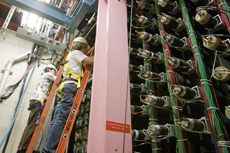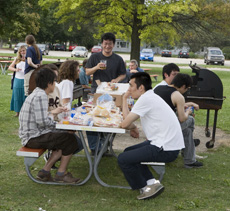SciBooNE detector parts move to other experiments

SciBooNE collaborators work on taking the neutrino experiment apart.
SciBooNE collaborators dug through piles of spare parts, untangling and categorizing dozens of cables to build their neutrino experiment last year.
Decommissioning its three subdetectors: SciBar, Muon Range Detector and the Electron Catcher this week will be easier.
The main bulk of the SciBar detector, borrowed from Japan's K2K experiment, will stay in the experiment hall, as will the steel plates for the MRD. Utilizing the SciBooNE equipment, a new experiment could start up by only replacing the electronics and photomultipliers. A couple groups already have expressed interest.
"It is a very robust, stable detector," said co-spokesperson Morgan Wascko, Imperial College London.
Although it took months to cobble SciBooNE together, collaborators will tear it down in less than three weeks. Removing and packing for shipment to KEK in Japan the 224 photo multiplier tubes and associated electronic panels will take the most time.
SciBooNE serves as the uber-example of parts sharing common to high-energy physics. Only the connectors, bolts and half the cables were purchased new.
Past Fermilab and KEK experiments provided the electronics and high-voltage system for the SciBar and MRD. Fermilab made SciBar's scintillate for use in Japan's K2K which later returned it for use in SciBooNE.
The Electron Catcher came to SciBooNE by way of K2K in Japan where it was constructed with calorimeter parts from Italy used in the CHORUS and HARP experiments at CERN. Italy's INFN also supplied the Electron Catcher's photo multiplier tubes and their electronics and the high-voltage system, which will return to Italy.
The Muon Range Detector photo multiplier tubes came from multiple sources. About 100 were borrowed from Kansas State University and the University of Rochester and will return there. The remainder came from Fermilab's KTeV experiment, wide-band lab, and SciBooNE member universities.
"Certainly some of our work would have been reduced by using newer equipment but the fact is we would have never got approval because the cost of our experiment would have been too high," Wascko said. "We reckon we saved over $3 million."
-- Tona Kunz

Collaborators celebrate SciBooNE's decommissioning at a party Friday, Aug. 22.
|